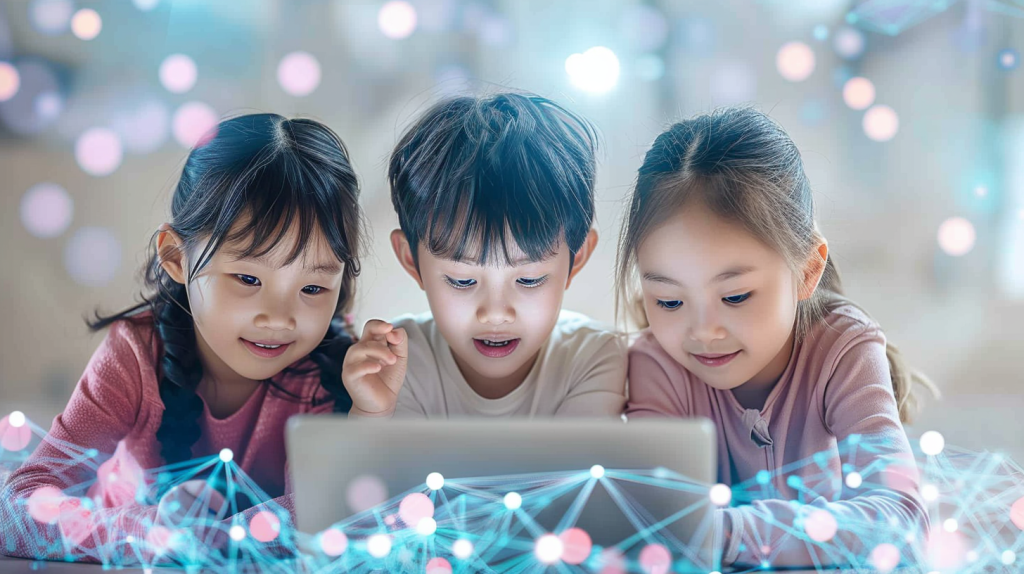In the rapidly evolving landscape of technology, Artificial Intelligence (AI) has emerged as one of the most transformative forces of our time. From enhancing daily conveniences to revolutionizing entire industries, AI’s impact is profound and far-reaching. Among the myriad of AI technologies, Generative AI stands out for its ability to create – it can generate text, images, music, and even entire virtual environments. This capability not only augments human creativity but also opens up new realms of possibilities in education, entertainment, healthcare, and beyond.
As the world becomes increasingly driven by AI, it is crucial to consider how we are preparing the next generation to navigate and thrive in this new reality. The ability to understand and apply Generative AI is rapidly becoming a fundamental skill, much like reading, writing, and arithmetic. However, there is a significant risk that without proactive education and exposure, many children will grow up without the essential knowledge and skills needed to harness the power of this technology effectively.

Imagine a future where AI tools are as commonplace as smartphones and computers, where children use AI to aid their learning, fuel their creativity, and solve complex problems. Now, contrast this with a scenario where children are merely passive consumers of AI technology, lacking the understanding and skills to engage with it meaningfully. The gap between these two futures is vast and has profound implications for individual opportunities, societal progress, and ethical standards.
In this blog, we will explore the critical reasons why teaching children about the applications of Generative AI is not just beneficial but necessary.
1. Lagging Behind in a Competitive World
Generative AI is already influencing job markets globally, with applications in fields as diverse as healthcare, finance, marketing, and entertainment. If children are not exposed to Generative AI, they risk falling behind their peers who are better prepared to navigate and leverage these technologies. This knowledge gap could result in limited career opportunities and reduced competitiveness in an increasingly AI-driven economy. For instance, AI proficiency is becoming a desired skill in many job descriptions, and without this knowledge, future job seekers might find themselves at a disadvantage.

2. Missed Opportunities for Creativity and Innovation
Generative AI is not just about technology; it’s also a catalyst for creativity and innovation. AI can assist children in creating music, art, stories, and even game designs, pushing the boundaries of their imagination. Without understanding how to use these tools, they miss out on opportunities to explore new creative processes and contribute to the arts and sciences in novel ways. For example, a child interested in art could use AI to experiment with different styles and techniques, learning more about artistic expression in the process.
3. Lack of Critical Thinking Skills
Teaching children about Generative AI goes beyond technical skills; it also involves fostering critical thinking and ethical considerations. Understanding how AI works, its potential biases, and its impact on society helps children develop a critical approach to technology. Without this knowledge, they might become passive consumers of AI-generated content, lacking the ability to question and critically analyze the technology they use. For example, understanding AI bias can help them recognize and challenge unfair algorithms, promoting a more equitable society.

4. Reduced Digital Literacy
In a world where digital literacy is becoming as important as traditional literacy, Generative AI plays a crucial role. Knowing how to interact with AI, from chatbots to AI-driven search engines, is essential for effective communication and information retrieval. Children who are not taught about Generative AI might struggle with digital literacy, making it harder for them to access and evaluate information in the digital age. For example, they might not be able to differentiate between AI-generated content and human-created content, leading to misinformation.
5. Unprepared for Ethical and Privacy Challenges
Generative AI raises significant ethical and privacy issues. For instance, AI-generated deepfakes can be used maliciously, and AI algorithms can perpetuate biases if not properly managed. By educating children about these challenges, we prepare them to navigate and address ethical dilemmas and privacy concerns. Without this education, children may become vulnerable to misinformation and unethical AI practices. For instance, understanding the implications of data privacy can help them protect their personal information online.
6. Limited Problem-Solving Abilities
Generative AI can be a powerful tool for problem-solving. For example, AI can help design efficient algorithms, create new products, and even assist in scientific research. By understanding how to harness AI, children can develop advanced problem-solving skills, essential for tackling complex real-world challenges. Without this knowledge, their ability to innovate and solve problems effectively is diminished. For instance, a child interested in engineering could use AI to simulate and test various designs, enhancing their understanding and capabilities.
7. Disconnect from Technological Advances
As AI continues to advance, those without knowledge of Generative AI risk being disconnected from significant technological progress. This disconnect can lead to a lack of engagement and participation in societal and technological discussions, further widening the gap between those who understand AI and those who do not. For example, they might be less likely to participate in discussions about AI ethics or the impact of AI on jobs, limiting their ability to influence future developments.

Final Thoughts
The application of Generative AI holds immense potential for the future, and it is crucial that we prepare our children to understand and use this technology responsibly and creatively. By integrating AI education into their learning journey, we equip them with the skills to thrive in a tech-driven world, foster their creativity, and develop their critical thinking abilities. Conversely, failing to do so could leave them at a significant disadvantage, both personally and professionally. Let us commit to making Generative AI an integral part of our children’s education, ensuring they are well-prepared to lead and innovate in the future.
Fostering AI literacy and responsible use of technology requires collaborative efforts from parents, educators, policymakers, and society at large. By providing resources and support for parents to engage with their children on AI topics, integrating AI education into school curricula, and investing in professional development for educators, we can empower the next generation with the knowledge and skills needed to thrive in an AI-driven world. Together, we can harness the transformative potential of AI to address global challenges, drive innovation, and create a more equitable and sustainable future for all.



